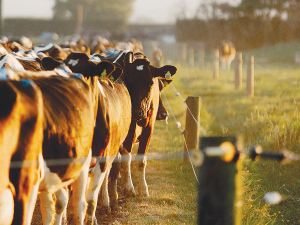New data released by LIC and DairyNZ shows New Zealand dairy farmers have achieved the highest six week in-calf rate and lowest notin- calf rate on record.
The average six week in-calf rate is sitting at 69.3% for the 2023-24 season, up 2.7% from last season (66.6%), while the not-in-calf rate is down to 15%.
The interim data, based on aged pregnancy test results from 4679 herds with a detailed DairyNZ fertility focus report in LIC’s MINDA software, represents 2.5 million cows from across New Zealand.
On a national scale, the DairyNZ InCalf calculator estimates these reproduction improvements could create $130.7 million in extra milk revenue.
DairyNZ senior scientist Chris Burke said improved reproduction performance could also help farmers to lower emissions.
“Herd reproductive performance is key in ensuring dairy farming success and in lowering methane emissions by reducing the number of non-productive cows. These results highlight the ongoing sector-wide opportunities to help farmers improve animal efficiency, to continue working towards emissions reduction goals.”
Jair Mandriaza, LIC senior reproduction solutions advisor, said this is great news for the dairy sector.
“From a national level, these results are very impressive and have been welcomed after a couple of tough seasons.”
Mandriaza noted the submission rate (the number of cows that were mated in the first three weeks) also increased compared to last season.
“It seems many farmers have implemented improved management practices to overcome those tough seasons and, coupled with favourable weather in many parts of the country, are now reaping the rewards of their hard work.”
Fonterra’s group director for Farm Source Anne Douglas says the latest results are particularly encouraging.
“Animal efficiency can improve farm profitability as well as positively impact a farm’s emissions intensity profile, which is important for our co-op,” says Douglas.
“We provide several tools and services supporting farmers, including our tailored Farm Insights Reports, and appreciate the work that LIC and DairyNZ are doing in this space.”











